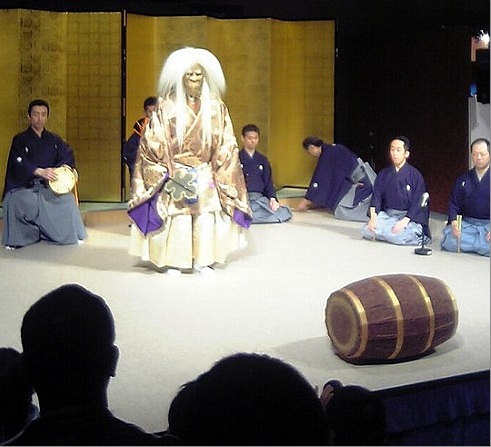What? Noh whisky?

Bakuryu being performed at Whisky Live! Tokyo
A Noh play about whisky? When I first heard the idea, I was flabbergasted.
Of the two major forms of Japanese theatre, Noh and Kabuki, Noh is by reputation the hardest to approach. Kabuki has all the exuberant populism of Shakespearean theatre. It traces its roots back to dance and light drama performances in Kyoto in 1603, about the same time Shakespeare was writing Othello, and has always retained its popular feel. It was a particular obsession of old Tokyo. Edward Seidensticker's history of Tokyo quotes an old aphorism that "the son of Kyoto ruined himself over dress, the son of Osaka ruined himself over food and the son of Edo ruined himself looking at things ... Performances were central to Edo culture, and at the top of the hierarchy, the focus of Edo connoisseurship, was the Kabuki theatre... The great Kabuki actors set tastes and were popular heroes and the Kabuki was for anyone, except perhaps the self-consciously aristocratic, who had enough money."
Noh has none of this populism. It has a much longer history than Kabuki and is essentially a religious ceremony, performed on consecrated ground and usually telling stories connected with death. Its dramas are very simple, stretched out over long periods with extended poetic monologues and very slow stage movements. The main character wears a mask. You cannot even see a face. Modern Japanese people have difficulty understanding the archaic language.
And yet Noh can actually be more rewarding than Kabuki for the foreigner. The fact that Noh's words are fairly incomprehensible and that they are really designed to provide a beautiful context for the movement on the stage actually makes the drama rather easy to appreciate for the non-Japanese speaker. There is word-play in Noh, but these are not fast, wise cracking stories that can turn on a few dramatic words. As long as you mug up on the often very simple tale before the performance, you can actually understand quite a lot of the context of the actors' lyrical movements and focus your mind on the wonder of the Noh mask: although its expression is completely fixed, the performer seems to fill the seemingly blank face with changing feeling by skillfully moving it in the light.
We are living in a time of great inventiveness in Japanese traditional theatre and arts in general. Some of the top performers regularly participate in the NHK children`s program "Nihongo de Asobou" in delightfully inventive sketches and dances. There are Kabuki performances of Shakespeare in the national theatre and now a newly written Noh play about whisky called "Bakuryu" ("gathering of the barley").
We got a glimpse of part of the play, written and performed by the Kamiasobi troupe, as part of the entertainment at Whisky Magazine Live! Tokyo. There was a full performance at the National Noh Theatre in Tokyo on February 3. Bakuryu's plot goes something like this:
Deep in the Scottish highlands a long long time ago, a distiller cries about the heavy whisky tax and prays for happier times. A very old man appears, saying he is the keeper of a pure water source. He tells the craftsman that if he follows his directions everything will be alright. He promises to return when the barrel is opened and disappears.I was frustrated to have missed the full performance at the National Noh theatre. The glimpse I got at Whisky Live! just rubbed it in: a unique play about a topic close to my heart performed with all the grace and haunting beauty of the Noh tradition. The Kamiasobi leaders told the audience at Whisky Live! that they were themselves devoted whisky drinkers and the play had grown out of their interest. I am sure there were also some robustly commercial incentives. They had bottles of specially labeled Bakuryu malt available at the National Theatre and it must have made a great ad for Whisky Live. But isn't commercialism and culturepreneurship a vital element of almost all periods of great cultural creativity? I find it exciting that this old art is not stuck in the mud but splashing around with these great new heresies.
The distiller follows the old man's instructions faithfully. After many years, he brings the barrel to the shrine. The old man, who all along was the barley god Bakuryu (is his name suggestive of Bacchus??) , appears. He praises the distiller and explains the virtue of whisky: it is the water of life and encourages a calm mind and spirit. When the barrel is opened, angels appear and dance (the angel's share?). The god promises peace and happiness and disappears once again.

Bakuryu whisky


Comments